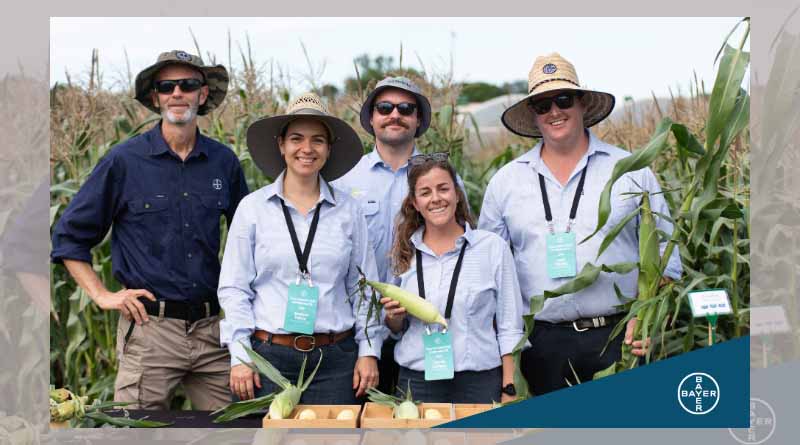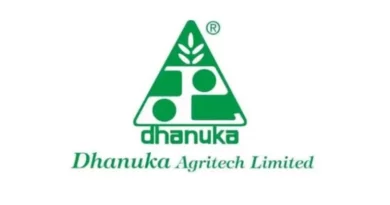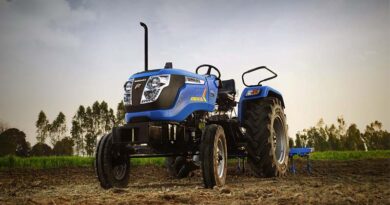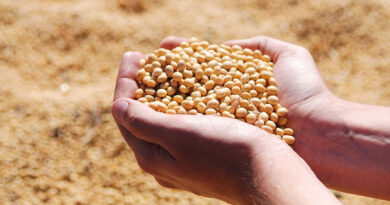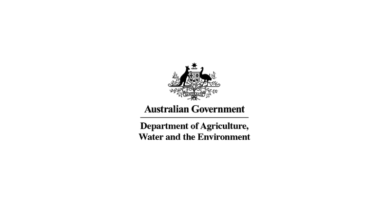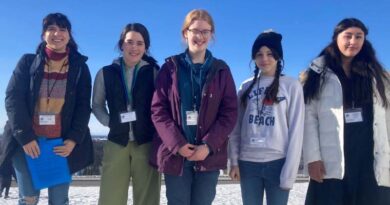Bayer in the Field campaign highlights how Bayer’s team is making an impact for growers on-the-ground
09 October 2023, AU: The Bayer in the Field campaign highlights some of the amazing work undertaken by the Bayer Crop Science team in delivering products and services that make a real impact to the productivity and profitability of growers all around Australia. The campaign highlights six members of the Bayer team and why they love the work that they do for Australian growers.
Alex Clancy
Key points:
- Alex is a firm believer in the ability of agricultural technology to help farmers produce more food from fewer inputs.
- He says well organised data can help farmers better understand things like crop growth patterns and soil variability, and how to most efficiently address any problems that may arise.
- Alex is a Customer Activation Specialist helping clients in the NSW Riverina implement the FieldView® digital data platform on their farms.
- FieldView helps growers collate their digital farm data, analyse it, and ultimately use it to drive productivity.
Alex Clancy spends his workdays helping customers simplify crop data management with FieldView® – a digital technology product he says will help drive efficiency in agricultural production.
He was immediately drawn to digital and precision agriculture when he left university, with a love of ag tech and helping the motivated growers to innovate and improve.
Now a Customer Activation Specialist working with Bayer’s FieldView product, Alex sees great potential in Australian agriculture.
“I think Australian growers are some of the most progressive and innovative, and as demand for agricultural productivity and sustainable practices continues to soar, it becomes increasingly important for them to use that data to help produce more from less,” he said.
“That’s everything from robotics to artificial intelligence and FieldView.”
FieldView helps growers collect their data, analyse it, and ultimately use it in their decision making.
“They can then start to think about putting more fertiliser in one area of the paddock over another or start teasing out the different varietal performances across the farm.”
As part of the digital farming solutions team based in the NSW Riverina, Alex helps ensure growers and advisors get the most out of FieldView.
“FieldView is a combination of a software platform, in the form of apps, and hardware … it can sound pretty complex, but really it’s about using powerful tools that are designed to be simple.”
He says this technology is just one of the promising developments that will help address the industry’s challenges.
“So for broadacre, this will be about collecting data and information from routine farm machinery activities to better understand soil variability or our crop growth patterns and using that to tailor practices to the specific needs of individual fields or zones within a field.”
Andrew Reddie
Key points:
- There were signs from a young age that Andrew was destined for a career in agriculture.
- His love of gardening started early – as a child he was always inspired by his grandfather’s garden.
- Today, he works as a Field Agronomist with Bayer in Queensland.
- Be it at work or at home, his love of plants is often top of mind.
A childhood love of plants and gardening with his grandfather were among the earliest indications Andrew Reddie was destined for a career in agriculture.
Andrew, who works as a Field Agronomist for Bayer in Queensland, says he was always inspired by his grandfather’s garden.
“That evolved into having a bit of a fascination with the plants,” he says.
“I used to love going to nurseries and picking out new plants for the garden.”
Andrew also spent part of his childhood living on a dairy farm, and says he always loved getting his hands dirty and being outside.
Today, his role is to conduct field trials and collect crop safety and efficacy data.
He travels throughout southeast Queensland, partnering with growers who are experiencing issues with their crops. Andrew treats a small area of the crop with the new products utilising scientific trials protocols and then observes, records and reports on the results.
“This data allows us to evaluate and prove that Bayer products will work to a satisfactory level under Australian conditions,” he says.
“We’re lucky in Australia to have such an amazing climate; there’s pretty much nothing we can’t grow here.
“But, at the same time, it’s a hard job to be a farmer. If we can add a few more effective tools to their toolkit that helps them produce high quality products, then that means a lot to me.”
Andrew says the ever-present threat of a new disease infiltrating Australia’s borders, combined with resistance issues and problems emerging from a changing climate reinforce the need for his work.
All the distance between farms for his field trials means there’s a lot of travel involved in Andrew’s work. However, in his down time he chooses to take a different mode of transport.
Andrew is a keen middle- to long-distance runner, and previously competed for Doncaster athletics club as a junior and has raced at the Stawell Gift.
“I used to enjoy a bit of footy too, but not as much now… I’ve sort of transitioned into boundary umpiring now.”
Given Andrew’s love of the outdoors, plants and exercise, it’ll come as no surprise that he also enjoys landscape gardening and tending to his vegetable patch!
Camila Campos
Key points:
- Perseverance pays for Camila.
- It has taken six years for her to start to see the benefits of her work flowing through to growers.
- Camila is a Market Development Specialist with Bayer, working to commercialise new vegetable crops for Australian and New Zealand growers, including sweet corn, beans, tomatoes, capsicums and lettuces.
- She says it’s hugely rewarding seeing the work pay off and new and improved varieties starting to land in growers’ hands.
If you need instant gratification to survive, Camila Campos’ job probably isn’t for you.
She has worked at Bayer for six years but is only just now starting to see some of her hard work come to fruition.
Camila is a Market Development Specialist working with beans, sweet corn, lettuces, tomatoes, capsicums, spinach, cucumbers and more in southeast Queensland.
She trials and evaluates new vegetable varieties on growers’ properties to test their suitability to Australian conditions.
The work helps identify varieties with higher yields, better disease resistance, and increased flavour. It also helps identify varieties that are more desirable to consumers and can more consistently meet market specifications.
Lately one of her main focuses has been on helping growers reduce production costs.
“We are looking for faster maturing crops to reduce water consumption, machine harvestable varieties to reduce labour and other costs,” Camila said.
Camila explained these factors mean farmers can benefit from more consistent incomes and increased growing efficiency, while conserving and protecting the environment.
She brings a global perspective to her role at Bayer, having studied in Argentina and later working in the U.S. before moving to Australia.
Camila says her work is complicated by the varying consumer preferences she has observed around the world.
“Our breeders are based all around the world and we need to share with them our market requirements and growing conditions to try and find the perfect varieties for our growers and consumers.
“My role covers Australia and New Zealand, and these two countries really are pretty similar in terms of what consumers are looking for.
“But we are really different from other countries. In some other countries, consumers don’t care as much about how their vegetables look.”
Despite the challenges, Camila says there’s great opportunity in Australian agriculture.
“Every year we get new tools and different ways to help growers, and we will need food forever, so there’s a lot of opportunity in ag.
“That rate of change is really exciting, and it’s nice in my role to be able to feel that you can help, even in a small way.”
Jagan Somasundaram
Key points:
- Jagan’s workplace isn’t your average office.
- He works at Bayer’s 129 ha ‘Locharba’ Narrabri research facility, with the aim of arming farmers with the flexibility to target a wider range of difficult-to-control weeds.
- Jagan is responsible for running field trials for Bollgard® 3/ XtendFlex® Cotton trait technologies – work he says is enjoyable and rewarding.
Given his job involves arming farmers with the flexibility to target a wider range of difficult-to-control weeds, you can see why Jagadeesan Somasundaram finds his job fulfilling.
Jagadeesan, known to his colleagues as Jagan, is a Market Development Manager for Agronomy in Bayer’s Market Development Team. He is responsible for running field research trials for Bollgard® 3/ XtendFlex® Cotton trait technologies – a valuable development for Australian cotton growers.
He says XtendFlex herbicide tolerance technology delivers sustainable weed control by providing additional herbicide modes-of-action that can be applied selectively in XtendFlex cotton, which results in a wider spectrum of weed control.
Jagan started work with Bayer Crop Science in India 17 years ago. He later made the move to Narrabri, in regional New South Wales, where he has observed the great potential in Australian agriculture.
“I feel optimistic about the future of agriculture in Australia,” Jagan says.
“The country has a number of advantages that make it well-positioned to succeed in the global agricultural market, including abundant natural resources, a favourable climate, a highly skilled workforce and a strong commitment to research and development.
“However, there are also some challenges that Australian agriculture will need to address in the future, including climate change, labour shortages and competition from other countries.”
Similarly, Jagan says there is always something new to learn and new technical hurdles to overcome for him in his work at Bayer.
“I like it that Bayer provides innovative solutions, such as crop protection products, seeds and digital tools to help address the challenges faced by the agriculture industry and help shape the future of Australian growers.”
Jagan says Bayer also takes an innovative approach to conducting field trials.
He says the company’s Narrabri site is not the average workplace. It’s a 129 ha site located 15 minutes out of town, allowing him the flexibility to conduct trials on the company’s own land.
When he’s not busy working to support the complex and ever-changing industry that is agriculture, you’ll find Jagan playing video games and chess with his teenage son, or playing badminton and cricket.
Julia Payne
Key points:
- Despite growing up on a cherry farm, Julia was discouraged from studying agriculture at school.
- Instead, she was encouraged to pursue a city-based career.
- She is now based in Perth with Bayer, helping farmers implement FieldView®. The FieldView technology helps them aggregate digital farm data in a single platform, enabling more efficient farm management.
- If you talk to her today, it’s hard to imagine her in any other field!
Despite growing up surrounded by farms and having an embedded passion for agriculture, Julia Payne was encouraged to pursue a city-based career.
But if you talk to her today, it’s hard to imagine her in any other field!
Julia is a Customer Activation Specialist with the Bayer Digital Farming Solutions team based in Perth. She covers Western Australia and South Australia, helping growers implement the FieldView® digital data platform and get the most out of the investment.
She studied accounting and agribusiness at La Trobe University, with a very different goal in mind.
The lack of awareness in school of the career opportunities in agriculture meant Julia was encouraged to consider another pathway to make use of her good grades, instead of “just” farming.
“I thought I’d be a forensic accountant,” Julia said.
“Although I still think today that forensic accounting would be very interesting, it wasn’t until I started the first semester of university that I very quickly learnt I was more passionate about agribusiness studies than I was for accounting studies.
While studying, Julia worked “almost full time” for a farm management company in her hometown of Mildura, tackling analytics and research.
She went on to work for several other companies, mostly with ag tech in horticulture – an industry she’s well-versed in, having grown up on a cherry farm.
But now Julia spends her days helping broadacre farmers.
“FieldView is a data collection and analysis tool for broadacre farmers that run multiple brands of primary farming equipment. It helps growers collect data from any machine and bring it all into the one place so they can use the data to make farming decisions – ultimately to maximise yield.
“My job is to raise awareness of the FieldView product and to help get farmers set up with the system and then handle the follow-up support. So when farmers want more machines set up or more layers of information and complexity added, I visit them again.”
Julia said most farmers have been collecting data from their crops for years, however her clients are now realising its real value.
She enjoys engaging with growers and says her own farming background helps build connections.
Julia travels extensively as part of her role, and that energy continues into her weekends – she plays netball and golf on weekends and, having swapped Mildura for the coast, maximises her time at the beach.
Add Julia’s socials into here (from below)
Scott Ward
Key points:
- When he’s not working to land the latest crop protection technology in the hands of Australian farmers, Scott is busy running his own farm.
- Scott is Bayer’s National Sales Manager for horticulture, based in Toowoomba.
- It’s his job to ensure Australian farmers have access to the Bayer range of products when and where they are needed.
- When he’s not busy doing that, he runs cattle and grows crops on his own property just out of town.
It’s not a huge stretch to say agriculture is in Scott Ward’s blood.
He is Bayer’s National Sales Manager for horticulture, managing a team of eight Territory Managers and two Business Development Managers across the country.
When he’s not helping farmers get their hands on the latest technology, including biologicals, Scott and his family run their own small farm just out of Toowoomba.
They run cattle and grow crops on the property, which also gives their children space to enjoy the outdoors riding bikes and horses.
Scott is the fourth generation of his family to come off the land at his family’s Goondiwindi property.
“We were frustrated farmers working in Melbourne when we lived there, and we wanted to get back home at some point,” Scott says.
“We managed to find our way back to Queensland and eventually shook off the frustration by buying a few acres out of town.”
Scott thinks farming essentially comes down to working in with mother nature and biology. He likes that his work allows farmers to do that more successfully.
“Bayer is all about innovation to provide solutions which enable farmers to grow crops of the highest quality to meet the demands of supermarkets and consumers.”
He points to Bayer’s development of new biological products as another way the company is innovating.
“We’re really thinking more about sustainable production for growers.”
Biological products can help to work in with the naturally occurring biological ecosystem farmers are working with. Biological products can enhance plant health, suppress and at times control fungal diseases and help to manage bacterial infections on crops.
“It’s a new frontier that growers are wanting to learn more about,” Scott says.
“Bayer is investing significantly in understanding the interactions plants have with biological organisms. It really is fascinating and exciting to be involved in world leading research which will bring the science and understanding of what’s going on around the plant’s root zone and put it into practice on Australian farms to help them build healthier soils, a healthier environment and crops of the highest quality.
“It’s advances like these that get me excited about the future of agriculture in Australia.”
Also Read: Brazil senate excludes ag from carbon market bill
(For Latest Agriculture News & Updates, follow Krishak Jagat on Google News)

